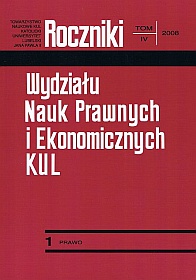Relacja państwa i porządku prawnego w myśli filozoficzno-prawnej Rudolfa Stammlera
Abstrakt
The article aims at showing the issue of the relation between the state and the legal order in the neo-Kantian philosopher Rudolf Stammler's philosophy of law. Stammler's thesis about the identity of the state and the legal order is accepted as the point of departure of the discussion. Analysis of the phenomenon of positive law as the logical condition for presenting the concept of the state finally leads to the conclusion that Stammler's position cannot be maintained, as it means „limiting the conceptual definition of the being of the state” to only one function, that is the function with the legislative character, consisting in creating and realizing legal norms. Finally it is said that Stammler „leaves out of his reasoning the fact that the state must not be understood as a being with the legal structure only, as, of its essence, it also has the political structure, existing largely outside the jurisdiction of legal norms”.
Bibliografia
Szyszkowska M., Neokantyzm. Filozofia społeczna wraz z filozofią prawa natury o zmiennej treści, Warszawa 1970.
Tokarczyk R., Filozofia prawa w perspektywie prawa natury, Białystok 1988.
Kość A., Podstawy filozofii prawa, Lublin 2001.
Stawecki T., Winczorek P., Wstęp do prawoznawstwa, Warszawa 2003.
Oniszczuk J., Filozofia i teoria prawa, Warszawa 2008.
Copyright (c) 2008 Roczniki Wydziału Nauk Prawnych i Ekonomicznych KUL

Utwór dostępny jest na licencji Creative Commons Uznanie autorstwa – Użycie niekomercyjne – Bez utworów zależnych 4.0 Międzynarodowe.

